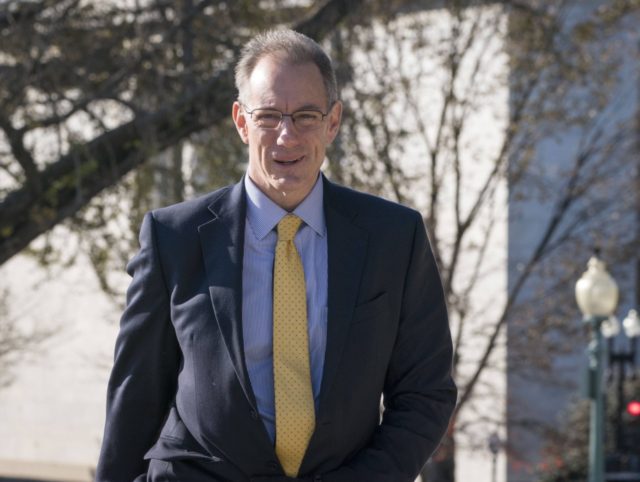Mark Sandy, an official at the White House Office of Management and Budget (OMB), testified earlier this month that he was told U.S. security assistance to Ukraine had been held up because of President Donald Trump’s concerns that other countries were not giving enough.
The House Intelligence Committee released a transcript of Sandy’s closed-door deposition on Tuesday afternoon, which had not been made available before recent public hearings in the impeachment inquiry.
Sandy testified that Trump began asking questions about the aid on June 19. He learned about the president’s decision to withhold the aid on July 18th, when he returned from leave. He sought advice from the OMB counsel, because the terms of the Impoundment Control Act set a limit to how long funds could be held. When he asked for the reason for the hold, his supervisor did not know, nor did anyone else.
Finally, he said, there was an email in early September that explained the reasoning: “I recall in early September an email that attributed the hold to the President’s concern about other countries not contributing more to Ukraine.” That was after a Politico article in late August revealing the existence of the hold, but before the transcript of the president’s phone call with Ukrainian President Volodymyr Zelensky was declassified and released on Sep. 25.
Sandy added that OMB officials had been asked to provide information “on what other countries were contributing to Ukraine.” He later testified that he could not recall a case where aid had been withheld for as long without a clear reason, though other witnesses had testified that aid to Lebanon was held up at the same time for unknown reasons.
The first written “apportionment” restricting the funds was issued on July 25 — the same date as the president’s call with Zelensky. There were several short-term restrictions after that. However, Sandy testified, the restrictions on the funds did not prevent the Department of Defense from preparing for the funds to be spent, eventually, as planned.
Sandy testified that another official took over the approval process for apportionments on July 30. Democrats tried, repeatedly, to probe for evidence that the reason for that decision was related to Ukraine, but Sandy said it was not.
Though not an attorney, Sandy testified that he and his colleagues “continued to expness concerns about the potential implications vis-a-vis the Impoundment Control Act,” which imposes restrictions on how long the president can withhold money that Congress has appropriated. There was also concern that if the funds were not appropriated by the end of the fiscal year on September 30, they would no longer be available for the Ukraine.
However, Sandy testified, he and other officials worked with the general counsel’s office, which gave its OK — even if, as other witnesses’ testimony suggested, other agencies within the government had a different view of the law.
The Intelligence Committee, which is controlled by Rep. Adam Schiff (D-CA) and the Democrat majority, issued a press statement accompanying the transcript in which it claimed that Sandy’s reason “was concocted as an after-the-fact rationalization to justify the hold” on Ukraine aid. As proof, it cited OMB Director Mick Mulvaney’s statement that the aid was withheld to encourage Ukraine to investigate possible interference in the 2016 presidential election.
However, Mulvaney did not make his statement until October 17, long after Sandy was told about the reason for the holdup in September.
Sandy added that no one in OMB tried to stop him from testifying, and many were supportive.
Mainstream media, including the Washington Post, led with the story that Sandy testified that two OMB officials had resigned over the hold on Ukraine aid. But Sandy testified that one resigned because of “frustrations about not understanding the reason for the hold” and that the other resigned because of “concerns about actions vis-a-vis the Impoundment Control Act.” Neither resigned because of reasons specific to the president’s approach to Ukraine.
Joel B. Pollak is Senior Editor-at-Large at Breitbart News. He earned an A.B. in Social Studies and Environmental Science and Public Policy from Harvard College, and a J.D. from Harvard Law School. He is a winner of the 2018 Robert Novak Journalism Alumni Fellowship. He is also the co-author of How Trump Won: The Inside Story of a Revolution, which is available from Regnery. Follow him on Twitter at @joelpollak.

COMMENTS
Please let us know if you're having issues with commenting.